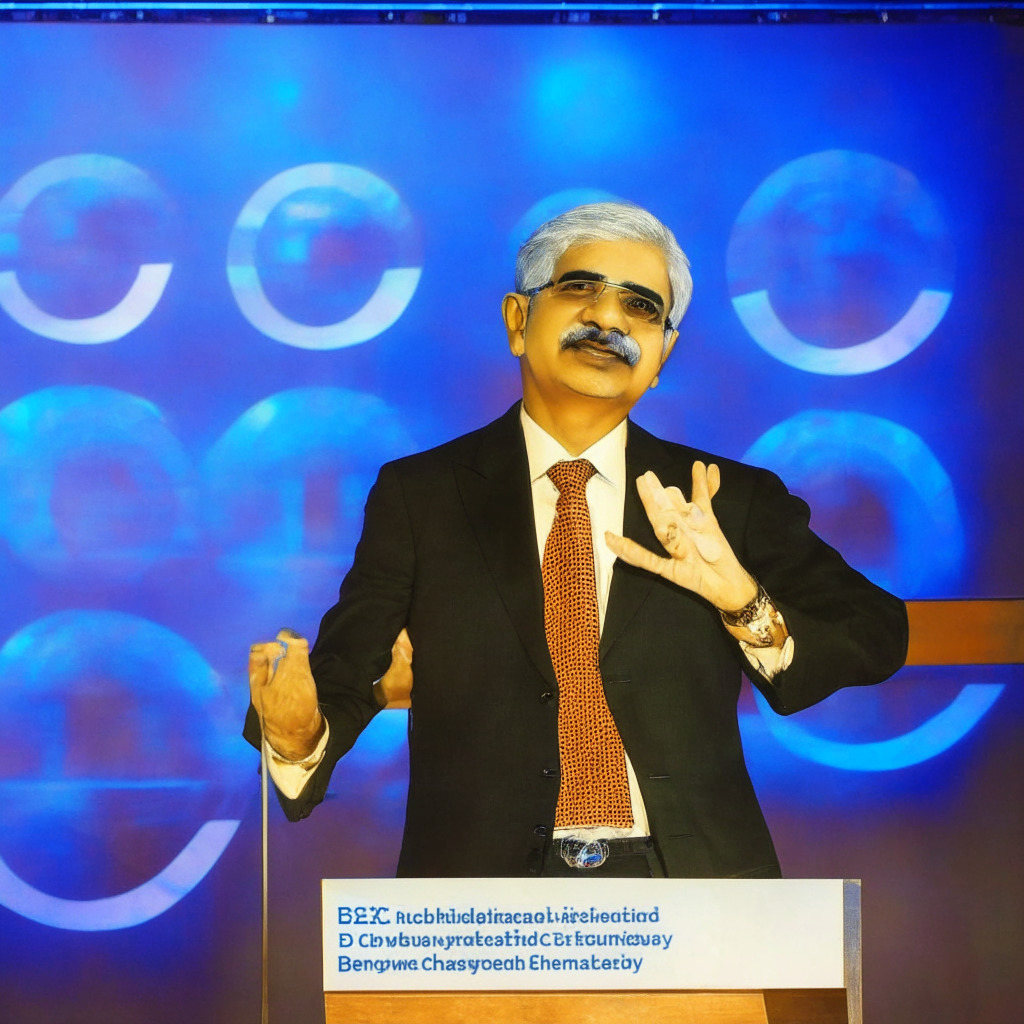Gemini, a cryptocurrency exchange, recently affirmed a $24 million investment for its expansion in India, a country teeming with technological innovation. Gemini’s ambitions of infrastructural growth are boosted by India’s growing status as a hub for technological development. Yet, the unpredictability of cryptocurrency and the volatile nature of regulations pose potential challenges.
Search Results for: Reserve Bank of India
Navigating the Future of Crypto Regulation in India: An Emerging Hope Amid Taxation Concerns
G20 members’ drive for global crypto regulation sparks hope among Indian crypto firms haunted by ambiguity. While the idea of self-regulation has its critics, Japan’s successful implementation bolsters confidence. Despite high taxes from the Indian government, India leads in crypto adoption, with investors increasingly using foreign platforms to avoid heavy tax impositions.
Navigating the Seas of Global Crypto Regulation: G20’s Role and India’s Stance Unveiled
“The G20 summit in India recently started a comprehensive global regulation on crypto assets, revealing global recognition of cryptocurrencies’ potential. Despite some disapproval, even India’s Reserve Bank permitted banks to service crypto companies, marking a significant shift towards global acceptance of cryptocurrency.”
Crypto Regulation Reforms: India’s Bold Stride for Blockchain Market Accountability
“India, a G20 summit member, is adopting robust regulations for cryptocurrencies instead of an outright ban. The proposed five-point crypto ordinance includes stricter Know Your Customer standards aligned with international anti-money laundering and FATCA regulations, real-time Proof-of-reserve audits, harmonised tax policy, and elevating crypto exchanges to authorised dealers.”
India’s Ambitious Plan: One Million CBDC Transactions by 2023 with Digital Rupee and UPI Integration
The Reserve Bank of India (RBI) is planning to increase daily retail Central Bank Digital Currency (CBDC) transactions from an average of 18,000 to one million by the end of 2023. RBI is also encouraging banks to facilitate e-rupee compatibility with Unified Payments Interface via QR codes for seamless transactions.
Navigating the Indian Crypto Market: Coinbase’s Struggles and Opportunities
Coinbase’s pursuit of the vast Indian crypto market is hampered by regulatory hurdles and authority negotiations. Despite termination of its service for some customers, it continues to operate. With high-profile exits and a confrontation with the Reserve Bank of India, the crypto giant faces challenges in adapting to the country’s market standards. Nonetheless, India’s advocacy for global crypto regulatory structures might signal a shift in the tides.
Global Push for Cryptocurrency Regulations: The G20’s Unified Front and India’s Leadership Role
“Under India’s G20 presidency, efforts are increasing to develop global cryptocurrency regulations. The dialogue includes both viewing cryptocurrency as a threat and an opportunity. The aim is to harness the potential of cryptocurrencies while mitigating inherent risks through unified global cooperation.”
Unleashing the Power of CBDCs: India’s Approach to Revolutionizing Global Finance
Reserve Bank of India’s Governor, Shaktikanta Das, emphasized the transformative potential of Central Bank Digital Currencies (CBDCs) in a recent G20 TechSprint Finale address. He outlined their potential to revolutionize international payment landscape by reducing costs and increasing transparency. India, currently testing its own CBDC, engages in comprehensive data collection and analysis for future policies. They also invite innovative solutions for cross-border CBDC platforms.
India’s SBI Leaps into Digital Realm: UPI Integration with Digital Rupee, A Step into the Future
“India’s largest public sector bank, SBI, has integrated UPI with the Digital Rupee, enabling 300 million UPI users and 500 million merchants to enhance their digital transactions. The ‘eRupee by SBI’ application potentially fuels secure and rapid exchanges, increasing national digital currency usage in regular transactions. However, the excitement around cryptocurrencies remains muted within the Indian government.”
Blockchain’s Rising Star in Global Finance: A Glimpse at India’s NPCI and London Stock Exchange Group’s Approach
“India’s National Payments Corporation is recruiting a blockchain expert, indicating a growing faith in blockchain’s potential in finance. Concurrently, the London Stock Exchange Group is leveraging blockchain to create a platform for traditional financial assets, possibly becoming the first major global exchange to establish a blockchain-powered ecosystem.”
Digital Rupee and Yes Bank Integration: A Gateway to Mass Adoption or a Breeding Ground for Risks?
“The digital rupee’s integration with Yes Bank’s app UPI extends its reach to millions of merchants in India, potentially driving its mass adoption. However, concerns regarding security, volatility and regulation of cryptocurrencies remain, alongside increasing competition. Despite these challenges, digital currencies showcase resiliency with digital rupee transactions worth $134 million reported within two months.”
India’s Blockchain Future: Ambani’s Gamble on Blockchain and CBDCs – Opportunities and Pitfalls
Mukesh Ambani’s Jio Financial Services (JFS) is promoting blockchain adoption and exploring central bank digital currencies (CBDCs) to aid digital inclusivity and financial growth in India. JFS aims to deliver blockchain-based products while ensuring utmost security, regulatory compliance, and customer data protection.
India’s Imprint on Global Crypto Legislation: A Leaning Tower or A Firm Stance?
India, the current G20 chair, has recently supported a globally aligned legislative framework for digital assets. Amid potential global regulations, India is pushing for a better understanding of the impact of digital currencies on emerging economies. However, it also highlights potential scams in economies with lax cryptocurrency regulations, enforcing the need for a globally aligned regulatory structure.
The Gathering Momentum of Central Bank Digital Currencies: Promise and Uncertainty
“Recent research reveals 93% of central banks are actively looking into Central Bank Digital Currencies (CBDCs). Despite this interest, 68% claim they aren’t ready to release their own digital currency soon. Emerging markets, aiming for financial inclusion, lead CBDC adoption.”
India’s Digital Rupee: A Cross-Border Game Changer against Dollar Deficiency
The Reserve Bank of India’s digital rupee initiative aims to simplify trade for countries with scanty US dollar reserves, potentially boosting India’s exports. This fast and cost-effective cross-border payment system could provide an economic solution for nations struggling with dollar deficiencies.
India’s Digital Rupee: CBDC Revolution or Privacy Concerns? Pros and Cons Explored
The Reserve Bank of India (RBI) progresses towards implementing the Digital Rupee, a central bank digital currency (CBDC), aiming to onboard one million users. RBI’s pilot program expands, promoting interoperability between CBDC QR codes and India’s Unified Payments Interface. Challenges like privacy and data security must be addressed to maintain trust.
JPMorgan Partners with Indian Banks: Blockchain’s Game-Changing Impact on Dollar Transfers
JPMorgan partners with six major Indian banks to introduce a blockchain-based platform for 24/7 dollar transfers, aiming to provide instant transactions and enhance interbank settlement systems. The pilot project, launching on June 5th, uses JPMorgan’s Onyx platform and could potentially revolutionize the financial landscape.
Tether Integration in Private Banks: New Era, Partnerships, and Global Adoption Challenges
The integration of Tether payment rails by Xapo Private Bank marks a new era, providing an alternative to SWIFT rails and showcasing stablecoins’ prominence in the financial sector. Blockchain adoption is recommended for India’s banks, while Binance explores partnerships with traditional financial institutions, and Layer 1 blockchain XDC Network partners with SBI VC Trade Co. Ltd.
Embracing AI and Blockchain: Indian Banking’s Future or Risky Path? Pros, Cons & Main Conflicts
Deputy governor Mahesh Kumar Jain urged Indian banks to adopt AI and blockchain for effective corporate governance and risk management. Technological disruptions, cybersecurity threats, and changing customer expectations can be addressed through strategic technology adoption, ensuring sustainable growth and staying ahead of the curve.
India’s e-Rupee Advancements: Boon or Bane for the Nation’s Financial Landscape?
India’s Reserve Bank is advancing its efforts in developing a digital rupee, with satisfactory results from two central bank digital currency test projects. Although this initiative holds potential to transform India’s financial landscape, concerns regarding technology, implementation, and security must still be addressed.
Expanding India’s CBDC Pilot: Innovation vs Potential Pitfalls in Digital Currency
The Reserve Bank of India (RBI) plans to expand its Central Bank Digital Currency (CBDC) pilot by increasing access points and participating banks, aiming to broaden the national digital currency’s scope and add more use cases throughout the year.
Bank of Japan’s CBDC Pilot: Global Trends and Privacy Concerns Clash
The Bank of Japan’s CBDC initiative report reveals 11 countries have introduced a central bank digital currency, while 18 others are in the pilot stages. Amid growing global interest, concerns about privacy and regulatory challenges persist as nations explore CBDCs’ potential in the future of finance.
Surviving the Storm: Indian Crypto Exchanges Adapt Amid Tax Hikes and Market Decline
Indian crypto exchanges face survival challenges due to stringent tax regulations and declining trading volumes. A 30% tax on crypto profits and a 1% tax on transactions are impacting the industry. However, India’s role as G-20 president in 2023 might provide hope for globally coordinated crypto rules.
India’s ₹2000 Note Withdrawal: Impact on Crypto and Rise of Digital Currencies
India’s financial landscape is changing as the Reserve Bank of India (RBI) withdraws ₹2000 denomination banknotes from circulation, while the country explores central bank digital currency (CBDC) with the E-Rupee Pilot Project. This raises questions about the impact on the burgeoning cryptocurrency market and the coexistence of CBDCs and cryptocurrencies in a more inclusive financial system.
Reinstating UPI Access for Indian Crypto Exchanges: Pros, Cons, and the Central Conflict
India’s government and Reserve Bank of India (RBI) face proposals to reestablish Unified Payments Interface (UPI) access for crypto exchanges amidst unclear cryptocurrency acceptance. Restoring UPI access could improve transaction tracking and protect investors while balancing industry struggles and regulatory measures for security and compliance.
Russia’s Shift in Economic Strategy: Buying Chinese Yuan for International Reserves
Russia is set to purchase Chinese yuan for its international reserves, indicating a strategic shift in its economic approach. This move, seen as a positive development, could signal a more stable Russian economy and have potential implications on the ruble and wider market as Russia seeks to rebuild its reserves amid international sanctions.
De-Dollarization’s Impact on US Banking Sector and Rise of Crypto Alternatives
IMF Managing Director, Kristalina Georgieva, highlights the growing trend of de-dollarization, increasing vulnerabilities in the U.S. banking sector, and the possible emergence of a new global currency. Crypto enthusiasts and industry professionals should closely monitor the shifting financial landscape and its potential global impacts.
Global Currency Shift: US Dollar’s Disproportionate Power and the Future of Reserve Currencies
Recent comments by Uday Kotak, CEO of India’s Kotak Mahindra Bank, have drawn attention to […]
RBI’s AI-Powered Conversational System for UPI: Innovations and Risks in Digital Payments
“The Reserve Bank of India (RBI) is considering an AI-powered conversational system to enhance transactions via the Unified Payments Interface (UPI). While holding immense potential, this AI innovation also poses risks. It’s crucial to examine all facets before fully embracing this technological innovation in the financial system.”
Global Digital Currency Race: Stablecoins Threat or CBDCs Safety?
“The race for global digital currency dominance has stablecoins and Central Bank Digital Currencies (CBDCs) in the lead. However, Rabi Sankar, Deputy Governor of the Reserve Bank of India, warns that stablecoins could pose significant policy sovereignty risks for certain nations.”
Expanding Crypto Conversations: RBI, Global Impact, and the Path to Unified Regulations
The Reserve Bank of India (RBI) has shifted its focus from individual nations and customers to the potential global risks of cryptocurrencies, emphasizing the need for unified international regulation. As the G-20 presidency holder, India aims to establish comprehensive crypto management frameworks to navigate the evolving landscape of digital currencies and their economic impact.
Global Crypto Regulation Changes Loom: Opportunities, Challenges and Stakeholder Reactions
“Finance ministers and central bank governors globally converging under India’s G20 presidency, discussing a roadmap for crypto regulations as part of the New Delhi Declaration. Discussions aim to strengthen crypto assets policy, planning for both the opportunities and challenges they present.”































